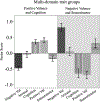Vulnerable Dispositional Traits and Chronic Pain: Predisposing but not Predetermining
- PMID: 34856411
- PMCID: PMC11484327
- DOI: 10.1016/j.jpain.2021.11.007
Vulnerable Dispositional Traits and Chronic Pain: Predisposing but not Predetermining
Abstract
Dispositional traits can be protective or contribute to increased vulnerability in individuals with chronic pain. This study aims to evaluate the association between two dispositional trait measures, affect balance style and multi-domain trait groups, with psychosocial measures, clinical pain, functional pain, and experimental pain at two years in individuals with chronic knee pain. The study is a prospective analysis of 168 community dwelling individuals aged 45 to 85 years old with knee pain with or at risk for knee osteoarthritis. At baseline, affect balance style and multi-domain trait groups were associated with psychosocial measures, clinical pain, and functional status. At the two-year time point, the multi-domain trait groups were associated with the clinical pain measures. Interestingly, individuals with previously demonstrated vulnerable traits showed more variability in dispositional trait status at the two-year time point compared to those with dispositional traits previously demonstrated as more protective. Findings reiterate that dispositional traits are predisposing but are not predetermining regarding pain-related experiences. PERSPECTIVE: Vulnerable and protective dispositional traits are positively and negatively associated with clinical pain and functional limitations respectively. Although considered relatively stable, a 30-50% shift in dispositional traits was indicated over a two-year period. Findings highlight that dispositional trait are modifiable and thus, predisposing but not predetermining for persisting chronic pain.
Keywords: Dispositional traits; affect; musculoskeletal pain; osteoarthritis; temperament.
Copyright © 2021 United States Association for the Study of Pain, Inc. Published by Elsevier Inc. All rights reserved.
Conflict of interest statement
The Authors declare that there is no conflict of interest and disclose receipt of the following support for the research, authorship, and publication of this article.
Figures

References
-
- Bartley EJ, Hossain NI, Gravlee CC, Sibille KT, Terry EL, Vaughn IA, Cardoso JS, Booker SQ, Glover TL, Goodin BR, Sotolongo A, Thompson KA, Bulls HW, Staud R, Edberg JC, Bradley LA, Fillingim RB: Race/ethnicity moderates the association between psychosocial resilience and movement-evoked pain in knee osteoarthritis. ACR Open Rheumatol 1:16–25, 2019 - PMC - PubMed
-
- Bellamy N, Buchanan WW: A preliminary evaluation of the dimensionality and clinical importance of pain and disability in osteoarthritis of the hip and knee. Clin Rheumatol 5:231–241, 1986 - PubMed
-
- Bellamy N, Buchanan WW, Goldsmith CH, Campbell J, Stitt LW: Validation study of WOMAC: A health status instrument for measuring clinically important patient relevant outcomes to antirheumatic drug therapy in patients with osteoarthritis of the hip or knee. J Rheumatol 15:1833–1840, 1988 - PubMed
-
- Berryman C, Stanton TR, Jane Bowering K, Tabor A, McFarlane A, Lorimer Moseley G: Evidence for working memory deficits in chronic pain: A systematic review and meta-analysis. Pain 154:1181–1196, 2013 - PubMed
Publication types
MeSH terms
Grants and funding
LinkOut - more resources
Full Text Sources
Medical

